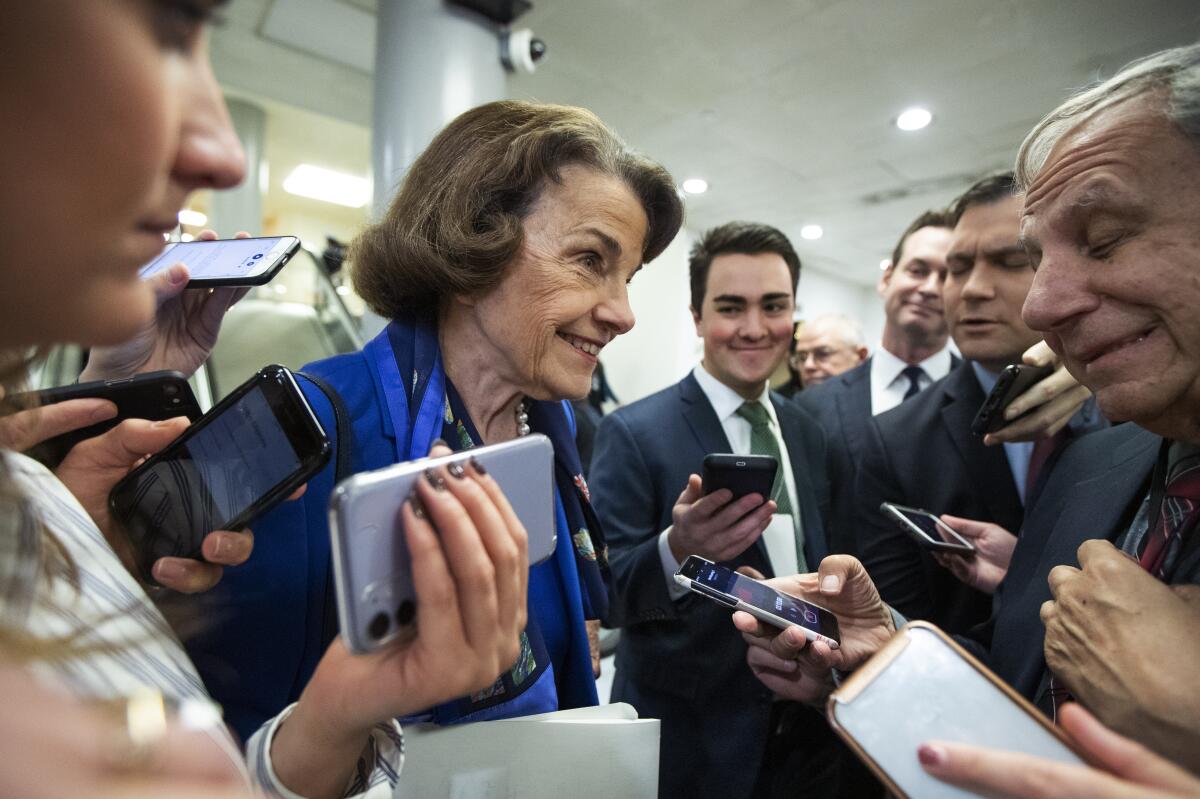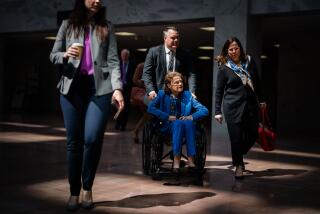Key votes in Senate impeachment trial unclear as Trump lawyers conclude their case

- Share via
WASHINGTON — The fate of key votes in President Trump’s impeachment trial remained uncertain Tuesday as his defense lawyers concluded their arguments and Republicans led by Senate Majority Leader Mitch McConnell struggled to muster the votes to bring the trial to a speedy close without calling witnesses.
But even as McConnell struggled to corral Republicans, Sen. Dianne Feinstein seemed to signal fissures in the unity of Senate Democrats. Feinstein suggested that while she had serious concerns about Trump’s character, she is still weighing her ultimate vote on whether to acquit him.
In their final arguments, Trump’s lawyers broadly dismissed the elephant in the Senate chamber: a reported firsthand account from John Bolton, the former national security advisor, that the president directly tied aid to Ukraine to his demands for the country to investigate political rival Joe Biden and his son Hunter.
Trump attorney Jay Sekulow dismissed reports of what Bolton wrote in the draft of a book he plans to publish in March as “an unpublished manuscript that maybe some reporters have an idea of maybe what it says.”
“If you want to call that evidence — I don’t know what you’d call that — I’d call it inadmissible,” he said.
The revelation on Sunday about Bolton’s book undercut the president’s defense and splintered Republicans, leaving a few of them calling for Bolton and other witnesses to testify.
Feinstein’s comments came initially in remarks to reporters outside the Senate chamber in which she said she had leaned against impeachment at the outset.
“Nine months left to go [before the election], the people should judge. We are a republic, we are based on the will of the people — the people should judge,” she said.
She then added: “That was my view and it still is my view.”
Still, she indicated that arguments in the trial about Trump’s character and fitness for office had shifted her thinking. “What changed my opinion as this went on,” she said, is a realization that “impeachment isn’t about one offense. It’s really about the character and ability and physical and mental fitness of the individual to serve the people, not themselves.”
In a later written statement, in which she said she had initially been “misunderstood,” Feinstein said “it’s clear the president’s actions were wrong.”
Feinstein told reporters that her office had received roughly 125,000 letters in support of the impeachment last week, and about 30,000 against it.
“There is substantial weight to this,” she said, “and the question is: Is it enough to cast this vote?”
Several Democrats have not ruled out voting for acquittal. But only a few have been considered truly up for grabs because of the strong support for Trump in their states: Sens. Joe Manchin III of West Virginia, Doug Jones of Alabama and Kyrsten Sinema of Arizona.
At a political rally in Wildwood, N.J., Trump said his impeachment and Senate trial were part of a “deranged partisan crusade” by Democrats and predicted they would suffer a “crushing defeat” in this year’s election as a consequence.
The trial is heading into a crucial stage. On Wednesday, senators will start their public questioning of both the defense team and the Democratic House impeachment managers. The key votes on whether to call witnesses are expected Friday.
GOP leaders have opposed calling witnesses, which would prolong the trial and introduce potentially damning testimony.
But after a closed-door strategy session of Senate Republicans on Tuesday afternoon, it did not appear that McConnell could be sure of having the votes he would need to defeat a move to call witnesses, although there are still several days to go before senators will have to decide.
“No clear conclusions,” Sen. Mike Braun (R-Ind.) said after the meeting.
Sen. Lamar Alexander (R-Tenn.), one of the most watched votes on the Republican side, said he would not make a decision until after senators’ questions are answered. “Then I’ll make a decision about whether we need more evidence in terms of documents and witnesses,” he said.
Many GOP senators were actively lobbying against any witnesses.
“All I can say is, I don’t need any more evidence, but if we do call witnesses, we’re just not gonna call one witness,” said Sen. Lindsey Graham (R-S.C.). “We’re gonna call a bunch of witnesses.”
“I’ll make a prediction,” Graham said: There will be “51 Republican votes to call Hunter Biden, Joe Biden, the whistleblower.”
“If people want witnesses, we’re going to get a lot of witnesses.”
In his concluding argument, Sekulow insisted that Trump’s actions toward Ukraine had been fully within his power as president.
“The president has constitutional authority to engage, conduct foreign policy and foreign affairs,” he said. “It is our position, legally, the president at all times acted with perfect legal authority.”
Sen. John Cornyn (R-Texas) echoed the defense argument Tuesday. Even if Democrats could get the necessary four Republican votes for a majority in favor of subpoenaing Bolton or other witnesses, it wouldn’t make much of a difference given that the Republican-majority Senate will almost certainly vote to acquit the president, he suggested.
“To me, it seems like the facts are largely undisputed; I don’t know what additional witnesses will tell us,” Cornyn said of Bolton. “We know what the facts are, and the question is whether the facts meet the constitutional standard of ‘high crimes and misdemeanors.’”
Bolton, a combative conservative and a hawk on national security, declined a House invitation to testify but subsequently said he would do so at the Senate trial if subpoenaed. However, the White House issued a blanket order blocking officials and documents, calling the impeachment process illegitimate.
Sen. Mitt Romney (R-Utah) made an impassioned speech during a party lunch Monday arguing for Bolton to be called, leading to a direct attack from Sen. Kelly Loeffler (R-Ga.). Afterward, Romney told reporters that “it’s increasingly likely” there will be enough votes to subpoena Bolton.
Underscoring the chaos the Bolton report has unleashed, other once-resistant Republicans seemed to shift their position on witnesses.
Graham, one of the president’s closest allies in the Senate, who initially opposed calls for any witnesses, on Tuesday supported a proposal by Sen. James Lankford (R-Okla.) that Bolton’s manuscript be made available for senators to read in a classified setting known as a SCIF, or Sensitive Compartmented Information Facility.
The idea could be viewed as a way of getting Bolton’s information to the Senate without his public testimony.
Sen. Charles E. Schumer (D-N.Y.), the Senate minority leader, rejected the proposal as “absurd.”
“It’s a book,” Schumer said of Bolton’s manuscript, which is set to publish in March. “There’s no need for it to be read in the SCIF unless you want to hide something.”
Sen. Rand Paul (R-Ky.) questioned Bolton’s motivations for wanting to testify, and the timing of the leak. “Democrats have spent a lot of time imagining what the president’s motives are,” Paul said. “Someone ought to spend some time imaging what John Bolton’s motives are other than making millions of dollars to trash the president.”
But Trump’s former White House chief of staff, John F. Kelly, told an audience in Sarasota, Fla., that “I believe John Bolton.”
The war over witnesses is likely to be reflected in senators’ written questions to the president’s lawyers and the Democratic House managers. They have up to 16 hours on Wednesday and Thursday for questions, which will go back and forth between Republicans and Democrats. Questions will be read aloud by Chief Justice John G. Roberts Jr.
Roberts said on Tuesday that lawyers on both sides should adhere to Chief Justice William H. Rehnquist’s guidelines in the President Clinton impeachment trial of a five-minute cap on answers.
Sen. Richard J. Durbin (D-Ill.), the Senate minority whip, said he had whittled his nearly 30 questions down to nine. Democratic leaders have collected draft questions to “avoid duplication and pick the ones in sequences that make sense in terms of delivering a message,” he said. Schumer said Democrats’ questions would give House managers a chance to rebut the Trump lawyers’ claims.
Several questions are expected about Bolton, with Republicans focusing on why the House didn’t push harder to get his testimony. Both Republicans and Democrats have also suggested they have questions about Rudolph W. Giuliani, the president’s personal lawyer, who was central to the dealings in Ukraine.
“I want to confirm that Rudy Giuliani was working personally for the president and not on behalf of the United States of America,” said Sen. Doug Jones (D-Ala.).
In an interview with CBS’ “This Morning,” to be aired Wednesday, Giuliani said he would be eager to testify to the Senate if the White House would let him and called Bolton a “backstabber.”
It’s unclear whether Republicans and Democrats could reach any agreement on calling witnesses, with additional testimony carrying risks for both sides. Many Republicans have said they would agree to calling Bolton only if the Bidens were also subpoenaed, while Democrats say they won’t be part of any such “trade” because the Bidens are irrelevant to the charges against Trump.
More to Read
Get the L.A. Times Politics newsletter
Deeply reported insights into legislation, politics and policy from Sacramento, Washington and beyond. In your inbox three times per week.
You may occasionally receive promotional content from the Los Angeles Times.













